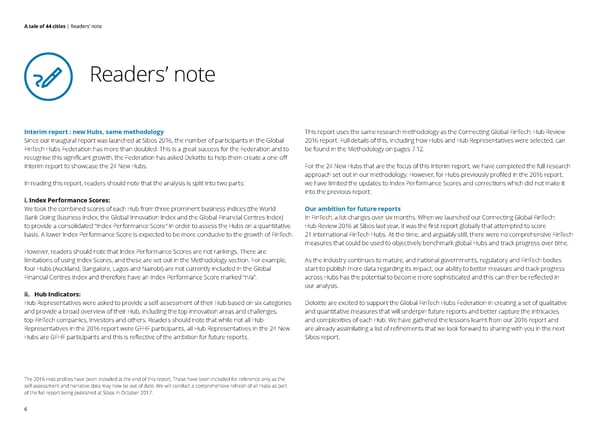A tale of 44 cities | Readers’ note Readers’ note Interim report : new Hubs, same methodology This report uses the same research methodology as the Connecting Global FinTech: Hub Review Since our inaugural report was launched at Sibos 2016, the number of participants in the Global 2016 report. Full details of this, including how Hubs and Hub Representatives were selected, can FinTech Hubs Federation has more than doubled. This is a great success for the Federation and to be found in the Methodology on pages 7-12. recognise this significant growth, the Federation has asked Deloitte to help them create a one-off Interim report to showcase the 24 New Hubs. For the 24 New Hubs that are the focus of this Interim report, we have completed the full research approach set out in our methodology. However, for Hubs previously profiled in the 2016 report, In reading this report, readers should note that the analysis is split into two parts: we have limited the updates to Index Performance Scores and corrections which did not make it into the previous report. i. Index Performance Scores: We took the combined scores of each Hub from three prominent business indices (the World Our ambition for future reports Bank Doing Business Index, the Global Innovation Index and the Global Financial Centres Index) In FinTech, a lot changes over six months. When we launched our Connecting Global FinTech: to provide a consolidated “Index Performance Score” in order to assess the Hubs on a quantitative Hub Review 2016 at Sibos last year, it was the first report globally that attempted to score basis. A lower Index Performance Score is expected to be more conducive to the growth of FinTech. 21 international FinTech Hubs. At the time, and arguably still, there were no comprehensive FinTech measures that could be used to objectively benchmark global Hubs and track progress over time. However, readers should note that Index Performance Scores are not rankings. There are limitations of using Index Scores, and these are set out in the Methodology section. For example, As the industry continues to mature, and national governments, regulatory and FinTech bodies four Hubs (Auckland, Bangalore, Lagos and Nairobi) are not currently included in the Global start to publish more data regarding its impact, our ability to better measure and track progress Financial Centres Index and therefore have an Index Performance Score marked “n/a”. across Hubs has the potential to become more sophisticated and this can then be reflected in our analysis. ii. Hub Indicators: Hub Representatives were asked to provide a self-assessment of their Hub based on six categories Deloitte are excited to support the Global FinTech Hubs Federation in creating a set of qualitative and provide a broad overview of their Hub, including the top innovation areas and challenges, and quantitative measures that will underpin future reports and better capture the intricacies top FinTech companies, investors and others. Readers should note that while not all Hub and complexities of each Hub. We have gathered the lessons learnt from our 2016 report and Representatives in the 2016 report were GFHF participants, all Hub Representatives in the 24 New are already assimilating a list of refinements that we look forward to sharing with you in the next Hubs are GFHF participants and this is reflective of the ambition for future reports. Sibos report. The 2016 Hub profiles have been included at the end of this report. These have been included for reference only as the self-assessment and narrative data may now be out of date. We will conduct a comprehensive refresh of all Hubs as part of the full report being published at Sibos in October 2017. 6
 A Tale of 44 Cities Page 5 Page 7
A Tale of 44 Cities Page 5 Page 7